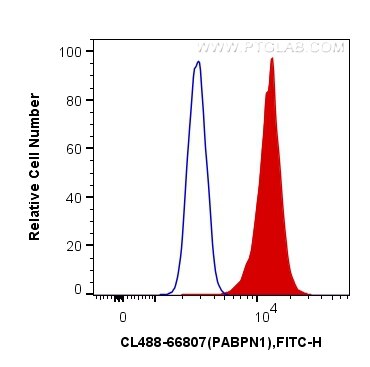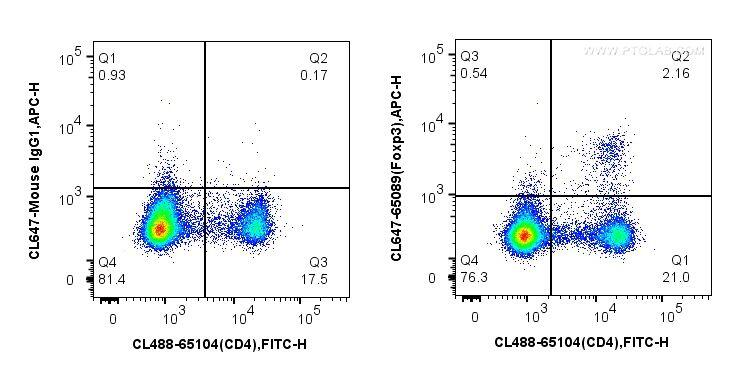- Featured Product
- KD/KO Validated
PABPN1 Monoklonaler Antikörper
PABPN1 Monoklonal Antikörper für FC (Intra)
Wirt / Isotyp
Maus / IgG1
Getestete Reaktivität
human, Maus, Ratte
Anwendung
FC (Intra)
Konjugation
CoraLite® Plus 488 Fluorescent Dye
CloneNo.
3C12E12
Kat-Nr. : CL488-66807
Synonyme
Galerie der Validierungsdaten
Geprüfte Anwendungen
| Erfolgreiche Detektion in FC | HeLa-Zellen |
Empfohlene Verdünnung
| Anwendung | Verdünnung |
|---|---|
| Durchflusszytometrie (FC) | FC : 0.40 ug per 10^6 cells in a 100 µl suspension |
| It is recommended that this reagent should be titrated in each testing system to obtain optimal results. | |
| Sample-dependent, check data in validation data gallery | |
Produktinformation
CL488-66807 bindet in FC (Intra) PABPN1 und zeigt Reaktivität mit human, Maus, Ratten
| Getestete Reaktivität | human, Maus, Ratte |
| Wirt / Isotyp | Maus / IgG1 |
| Klonalität | Monoklonal |
| Typ | Antikörper |
| Immunogen | PABPN1 fusion protein Ag27470 |
| Vollständiger Name | poly(A) binding protein, nuclear 1 |
| Berechnetes Molekulargewicht | 33 kDa |
| Beobachtetes Molekulargewicht | 50-56 kDa |
| GenBank-Zugangsnummer | BC010939 |
| Gene symbol | PABPN1 |
| Gene ID (NCBI) | 8106 |
| Konjugation | CoraLite® Plus 488 Fluorescent Dye |
| Excitation/Emission maxima wavelengths | 493 nm / 522 nm |
| Form | Liquid |
| Reinigungsmethode | Protein-G-Reinigung |
| Lagerungspuffer | BS mit 50% Glyzerin, 0,05% Proclin300, 0,5% BSA, pH 7,3. |
| Lagerungsbedingungen | Bei -20°C lagern. Vor Licht schützen. Nach dem Versand ein Jahr stabil. Aliquotieren ist bei -20oC Lagerung nicht notwendig. 20ul Größen enthalten 0,1% BSA. |
Hintergrundinformationen
Poly(A) Binding Protein Nuclear 1(PABPN1) is one of the isoforms of poly(A) binding protein (PABP) that locating to the nucleus in eukaryotic cells. And PABPN1 plays important role in mRNA stability by regulating of poly-A tail length, mRNA decay and proximal polyadenylation site (PAS) utilization at the 3'-UTR (PMID:23300856). Another report showed that PABPN1 shuttles between the nucleus and the cytoplasm to export poly(A) RNA from the nucleus (PMID:23601051). It is reported that PABPN1 is ubiquitously expressed in almost all tissues, however, mutations in PABPN1 causes Oculopharyngeal Muscular Dystrophy (OPMD) which affected in skeletal muscles specifically. Because of a mild reduction in PABPN1 levels is sufficient to induce muscle wasting (PMID:27152426). Acetylation, Methylation, Phosphoprotein are common post-translational modifications of PABPN1 protein. And 50-55 kDa bands have been reported (PMID: 29939290; 28361972).
Protokolle
| Produktspezifische Protokolle | |
|---|---|
| FC protocol for CL Plus 488 PABPN1 antibody CL488-66807 | Protokoll herunterladen |
| Standard-Protokolle | |
|---|---|
| Klicken Sie hier, um unsere Standardprotokolle anzuzeigen |



